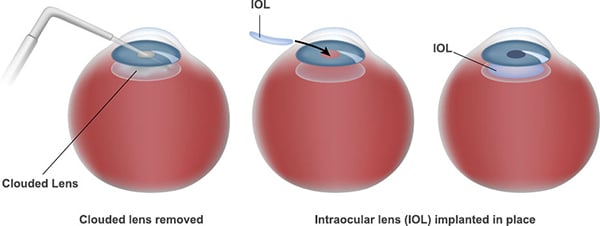Cataracts
 When a cataract develops, it means the natural lens of the eye has become clouded. This affects a person’s quality of vision, and can continue to progress to the point of causing blindness, if left untreated. Cataracts affect nearly all adults as they age, but can affect younger individuals, as well, so it is important to schedule an eye exam regularly. Some of the signs and symptoms of cataracts include:
When a cataract develops, it means the natural lens of the eye has become clouded. This affects a person’s quality of vision, and can continue to progress to the point of causing blindness, if left untreated. Cataracts affect nearly all adults as they age, but can affect younger individuals, as well, so it is important to schedule an eye exam regularly. Some of the signs and symptoms of cataracts include:
- Blurry or clouded vision
- Seeing distorted or yellowed colors
- A “halo” effect around lights
- Light sensitivity
- “Ghost” images
- Double vision
- Difficulty with night vision
- Glare
- Progressive deterioration of vision
At Prestera Eye, Dr. Tory Prestera and Dr. Guan perform cataract surgery with the latest technology and techniques, and utilize premium intraocular lenses for exceptional outcomes. If you are experiencing some or all of the symptoms noted above and think you may have developed cataracts, please contact us today to make an appointment. In your consultation, one of our experienced cataract surgeons will conduct a thorough evaluation of your vision and speak with you about your options.
Cataract Surgery
During cataract surgery, the clouded lens is removed and replaced with a specialized device called an intraocular lens (IOL). At Prestera Eye, our surgeons are highly trained and experienced in handling even complex cataract cases. With the wide range of premium IOLs available at our practice, Dr. Prestera and Dr. Guan can customize your surgical plan to ensure patient satisfaction.
Multifocal & Toric IOLS
Dr. Prestera and Dr. Guan offer a variety of intraocular lens (IOL) options, to provide patients with the best possible outcomes. Advanced technology intraocular lenses such as multifocal and toric IOLs can offer patients less dependence on glasses after surgery. Multifocal IOLs have a unique advantage over monofocal IOLs, since monofocal lenses can only focus on either near vision or far vision — meaning the patient would typically still require glasses. With multifocal lenses, the effects of presbyopia can be addressed by improving the eye’s ability to see both near and far. Additionally, we offer toric IOLs for patients with astigmatism. For complex cataracts or cases where there is insufficient capsular support for the IOL, Dr. Prestera and Dr. Guan can utilize sutured IOLs or scleral fixated IOLs.

Posterior Capsule Opacification (PCO)
Many patients wonder if cataracts can come back after cataract surgery. Thankfully, once the eye’s natural lens has been replaced with an IOL, a cataract cannot form again. However, in some rare cases, scar tissue can form behind the IOL, on the lens capsule (the membrane that previously surrounded the natural lens). This is referred to as posterior capsule opacification (PCO). PCO causes clouded vision similar to what is experienced with cataracts, but a repeat cataract surgery is not necessary. Treatment for PCO is fairly simple — our doctors can resolve the issue with the use of a specialized laser designed to clear the scar tissue, allowing light to pass through the eye again. This procedure can be done in a few minutes in our office.
Contact Prestera Eye Medical Group
To learn more about cataracts, or to schedule an appointment with Dr. Prestera or Dr. Guan. Please contact us today.